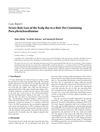Alopecia in general medicine
February 2016
in “Clinical Medicine”

TLDR The document concludes that diagnosing and treating hair loss is complex and requires understanding its psychological effects and underlying causes, while also calling for more research and new treatments.
The 2016 document highlights the complexity of diagnosing and managing various forms of alopecia in general medicine. It underscores the necessity of recognizing the psychological impact of hair loss, the potential for underlying medical conditions to cause alopecia, and the importance of accurate diagnosis through patient history, blood tests, and scalp biopsies. The document reviews conditions such as telogen effluvium, chemotherapy-induced alopecia, male and female pattern hair loss, alopecia areata, and scarring alopecias, noting treatments like minoxidil, finasteride, and emerging therapies like Janus kinase inhibitors. It also mentions an increase in frontal fibrosing alopecia, especially in post-menopausal women, and calls for more research into its causes. Additionally, the document discusses other causes of hair loss, including infections and systemic diseases, and emphasizes the need for novel treatments based on a deeper understanding of the pathobiology of hair loss disorders.
View this study on rcpjournals.org →
Cited in this study

research Killing Two Birds with One Stone: Oral Tofacitinib Reverses Alopecia Universalis in a Patient with Plaque Psoriasis
A man with severe hair loss and skin disease regrew his hair with no side effects after taking tofacitinib.
research Alopecia areata is driven by cytotoxic T lymphocytes and is reversed by JAK inhibition
Alopecia areata can be reversed by JAK inhibitors, promoting hair regrowth.
research Efficacy of interventions for prevention of chemotherapy‐induced alopecia: A systematic review and meta‐analysis

research Analysis of quantitative changes in hair growth during treatment with chemotherapy or tamoxifen in patients with breast cancer: a cohort study
Chemotherapy causes hair loss starting soon after treatment begins and recovers about 3 months after ending, while tamoxifen does not significantly affect hair growth.

research Docetaxel and permanent alopecia
Some breast cancer patients treated with high-dose docetaxel may experience permanent hair loss.

research Recurrent episodes of hair loss in a 37 year old woman
The woman's hair loss was mainly due to stress and low iron levels, and her hair grew back after treatment.

research Hair loss in hospital medicine: a practical guide
The guide helps clinicians diagnose and manage hair loss, detailing examination techniques and treatments for different types of alopecia.

research British Association of Dermatologists’ guidelines for the management of alopecia areata 2012
Guidelines suggest various treatments for alopecia areata, but leaving it untreated is also an option as 80% cases may recover on their own.

research Hair through the female life cycle
Women's hair generally gets thinner and less dense starting in their mid-thirties, with hair loss becoming more common as they age due to both genetics and environment.

research Permanent Alopecia After Systemic Chemotherapy: A Clinicopathological Study of 10 Cases
Chemotherapy can cause permanent, non-reversible hair loss similar to pattern baldness.

research S1 guideline for diagnostic evaluation in androgenetic alopecia in men, women and adolescents
Guidelines for diagnosing common hair loss include detailed history, clinical examination, and various diagnostic techniques.

research Management of primary cicatricial alopecias: options for treatment
There are many treatments for permanent hair loss disorders, but their effectiveness varies and there's no clear best option.

research Familial aggregation of alopecia areata
Alopecia areata, a common autoimmune hair loss condition, often runs in families.

research Women who present with female pattern hair loss tend to underestimate the severity of their hair loss
Women with female pattern hair loss often underestimate how severe it is.

research The Biology of Hair Follicles
Hair follicle biology advancements may lead to better hair growth disorder treatments.

research A randomized trial of minoxidil in chemotherapy-induced alopecia
Minoxidil shortens baldness from chemotherapy by 50.2 days without significant side effects.
Related

research Efficacy of systemic minoxidil and tofacitinib combination in treatment‐resistant alopecia universalis
Using minoxidil and tofacitinib together can effectively treat severe hair loss.

research Bitemporal Scalp Hair Loss: Differential Diagnosis of Nonscarring and Scarring Conditions.
Understanding the cause of bitemporal hair loss is key to deciding the right treatment.

research A clinico-epidemiological study of scalp hair loss in children (0–18 years) in Kota Region, South-East Rajasthan
About 12% of children in Kota, Rajasthan, experience hair loss, mainly due to fungal infections, with early treatment advised to prevent worsening.

research Hair loss in children: Common and uncommon causes; clinical and epidemiological study in Jordan
The most common causes of hair loss in Jordanian children are fungal infections, autoimmune hair loss, and hair shedding after fever, with zinc deficiency also being a notable cause.

research Severe Hair Loss of the Scalp due to a Hair Dye Containing Para phenylenediamine
A woman lost most of her hair due to an allergic reaction to a hair dye ingredient.

research Alopecia areata: Clinical presentation, diagnosis, and unusual cases
Alopecia areata is a type of hair loss that can lead to complete baldness, often associated with other autoimmune conditions, and half of the cases may see hair return within a year.

research Diagnosis of Hair Loss: Clinical features of common causes of hair loss.
The document describes the signs of different common types of hair loss.

research Diagnosis and management of the hair loss patient.
Most hair loss cases are caused by four main conditions, and understanding them is key to treatment.